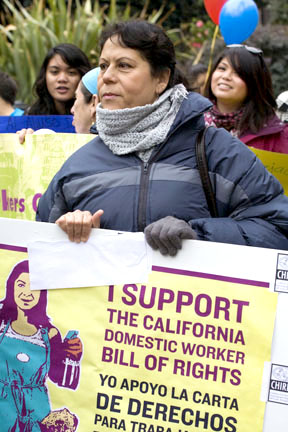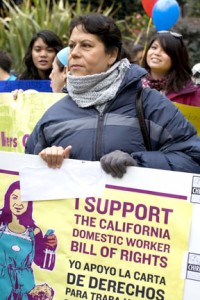
Extending Labor Protections to Domestic Workers
January 15, 2013Student Blogs Article On October 1, 2012, Governor Jerry Brown disappointingly vetoed a bill that would have regulated and provided protections to domestic workers and would have guaranteed them decent working conditions and pay. The Domestic Workers Bill of Rights or California AB 889, would have entitled domestic workers such as housekeepers, nannies, and caregivers for children, persons with disabilities, and the elderly, work[ing] in private households to overtime pay, workers’ compensation, and time for meals and rest breaks.
On October 1, 2012, Governor Jerry Brown disappointingly vetoed a bill that would have regulated and provided protections to domestic workers and would have guaranteed them decent working conditions and pay. The Domestic Workers Bill of Rights or California AB 889, would have entitled domestic workers such as housekeepers, nannies, and caregivers for children, persons with disabilities, and the elderly, work[ing] in private households to overtime pay, workers’ compensation, and time for meals and rest breaks.
These regulations are particularly important for domestic workers who live in the home with their employer. Indeed, live-in domestic workers are the most vulnerable to labor abuse because of their constant physical availability to the employer and because many are isolated from their family and community—they face a greater threat of violence, harassment, rape, and physical and mental abuse. California’s legislation would have extended special protections to this population by, for example, allowing them the right to eight hours of sleep and the right to use employers’ kitchens to cook their own food.
New York State has already passed similar legislation protecting domestic workers, which guaranteed a 40-hour work week and appropriate overtime pay. The New York law also directed the Commissioner of Labor to study the practicality of extending collective bargaining rights to domestic workers.
From a labor law standpoint, these are not “new” rights by any means. Indeed, the eight-hour work day, overtime policies, and meal requirements are the cornerstones of the Fair Labor Standards Act, passed in 1938. However, because domestic workers are excluded from the Act, they remain largely unprotected by these labor laws and also remain unable to collectively bargain for decent working conditions. Additionally, because the population of domestic workers is largely foreign-born and isolated in the private homes, they have a limited ability to organize and advocate for themselves.
There are also mental health implication for live-in domestic workers and unregulated working standards for domestic workers. Indeed, research on social isolation has revealed that such conditions make individuals inherently vulnerable to mental illness. For example, social isolation after giving birth is associated with the onset of postpartum depression in new mothers. Because such a solitary environment can have such deleterious effects on mental health on mothers, clearly domestic workers such as housekeepers and nannies may suffer from the same effects of isolation and such symptoms may be more salient in the context of having to care for children that are not your own.
Protecting the mental and physical health and working conditions of domestic workers is clearly important given their responsibility in American households: they are caring for our children and living in our homes. States have a responsibility to extend labor protections to this inherently vulnerable population of workers.
You may also like
2 comments
- October 2024
- April 2024
- March 2024
- February 2024
- November 2023
- October 2023
- April 2023
- March 2023
- February 2023
- January 2023
- December 2022
- November 2022
- October 2022
- May 2022
- April 2022
- March 2022
- February 2022
- January 2022
- December 2021
- November 2021
- October 2021
- May 2021
- April 2021
- March 2021
- February 2021
- January 2021
- November 2020
- October 2020
- September 2020
- August 2020
- July 2020
- June 2020
- May 2020
- April 2020
- March 2020
- February 2020
- January 2020
- November 2019
- October 2019
- September 2019
- April 2019
- February 2019
- December 2018
- November 2018
- October 2018
- September 2018
- March 2018
- February 2018
- January 2018
- December 2017
- November 2017
- October 2017
- September 2017
- May 2017
- April 2017
- March 2017
- February 2017
- December 2016
- November 2016
- October 2016
- April 2016
- March 2016
- February 2016
- January 2016
- December 2015
- November 2015
- October 2015
- June 2015
- May 2015
- April 2015
- March 2015
- February 2015
- January 2015
- December 2014
- November 2014
- October 2014
- August 2014
- March 2014
- February 2014
- January 2014
- December 2013
- November 2013
- October 2013
- September 2013
- May 2013
- April 2013
- March 2013
- February 2013
- January 2013
- December 2012
- November 2012
- October 2012
- September 2012
- June 2012
- April 2012
- March 2012
- February 2012
- January 2012
- December 2011
- November 2011
- October 2011
- September 2011
- August 2011
- April 2011
- March 2011
- November 2010
- October 2010
- September 2010
Great post! Thank you for highlighting this bill. Hopefully, a new bill will pass soon. Domestic workers seem like a vulnerable population in need of greater protections.
I think that this article addresses an important issue, and I fully agree that Labor Standards legislation should extend to this group of domestic workers. I’m not sure, however, that this would solve the problems associated with the solitary lifestyle. After all, even if the workers were allowed to use the homeowner’s kitchen, they would still likely spend most of their days alone. Perhaps the 40 hour work week portion of the legislation would help ensure that the workers could get out and socialize more? I certainly don’t know enough about the topic to weigh in any more than that, but it seems like maybe the isolation problem is a separate issue that should be considered.